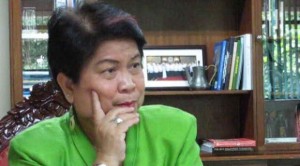ZAMBOANGA CITY – Social Welfare Secretary Corazon “Dinky” Soliman has said December 15 has been set as the deadline for the transfer of residents displaced by the battle of Zamboanga in September 2013 to halfway houses while they await completion of their permanent new homes.
”We are continuously putting up transitional shelters so they could be transferred on or before December 15,” Soliman told reporters in the course of a visit here.
Among those eyed for transfer are 2,304 families —12,476 individuals— still staying under appalling conditions at the grandstand of the Joaquin Enriquez Memorial Sports Complex.
About 120,000 residents were displaced during the siege laid on the city followers of Moro leader Nur Misuari in September 2013, and the grandstand was among the places where the internal refugees sought shelter.
Soliman said that families staying at the grandstand were to be transferred to the transitory sites in Masepla, Boggoc and Tulungatung by December 15 and would be able to occupy permanent homes in the Sta. Catalina and Paniran resettlement areas by 2016.
On Friday, at least 200 families staying on the Cawa Cawa shoreline were brought to Masepla and Boggoc, just days after the August deadline to do so passed.
A total of 49 families have also recently been transferred to Martha Drive.
The authorities said they wanted the displaced residents moved out of their present overcrowded encampments to prevent more deaths from various illnesses. Congestion has been among the factors blamed for the deaths of 182 deaths in the evacuation centers.
Among the latest to die was a two-month-old baby girl at Cawa-cawa.
Dr. Rodelin Agbulos, the city’s health officer, told the Inquirer that pneumonia and gasto-enteritis remained the top killer diseases in the in the evacuation camps.
But there have also been deaths due to the highly-infectious diseases such as tuberculosis and measles.
Zenaida Arevalo, social welfare director for Western Mindanao, said some of those who died were already ill prior to entering the evacuation camps, although she ack nowledged that the congestion worsened their condition.
Arevalo cited poor hygiene and sanitation hastened the spread of diseas among the evcuees, she added.
Peter Deck, head of Mindanao office of the United Nations High Commissioner for Refugees, told the Inquirer that the deaths would be acceptable “if it was right after the emergency situation.”
“But now, it has been almost a year, and there is no emergency,” he said.
Deck said the health situation could be blamed on “us not taking the appropriate decisions like providing appropriate living spaces, water and sanitation and access to livelihood.”
“There should be no people, children dying of diarrhea, dehydration in locations when humanitarian actors have been assisting now for 11 months, and that is an embarrassment to the way we are doing our work. So we are not doing our job adequately,” Deck lamented.
Zamboanga City Mayor Maria Isabelle Salazar dismissed Deck’s assessment as a plain outburst of emotion.
“I have communicated with its head in Geneva, and Mr. Peter Deck is a representative of UNHCR. Nonetheless, those are his feelings and it should be separated from objective assessment,” Salazar said.
The mayor said the deaths took place not because of government inaction but because of other factors such as congestion.
RELATED STORY
Thousands still in evacuation center 11 months after Zamboanga siege
